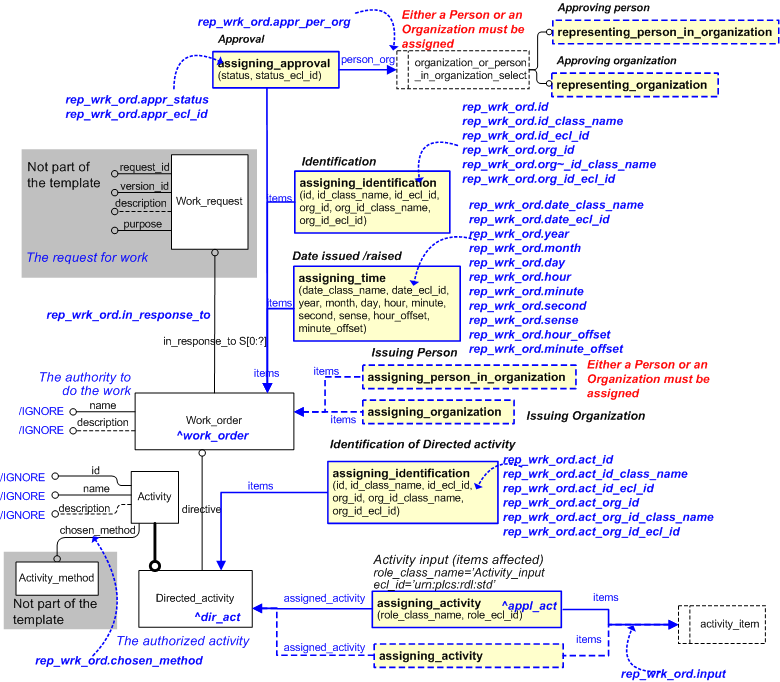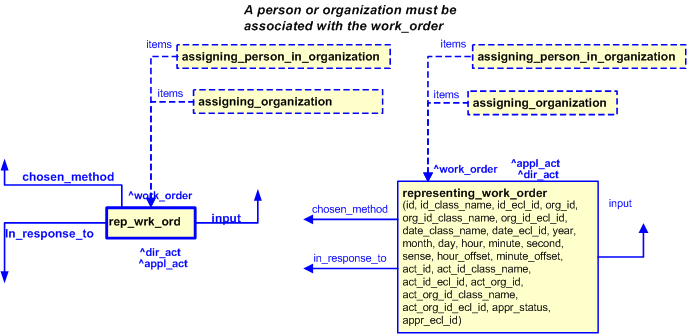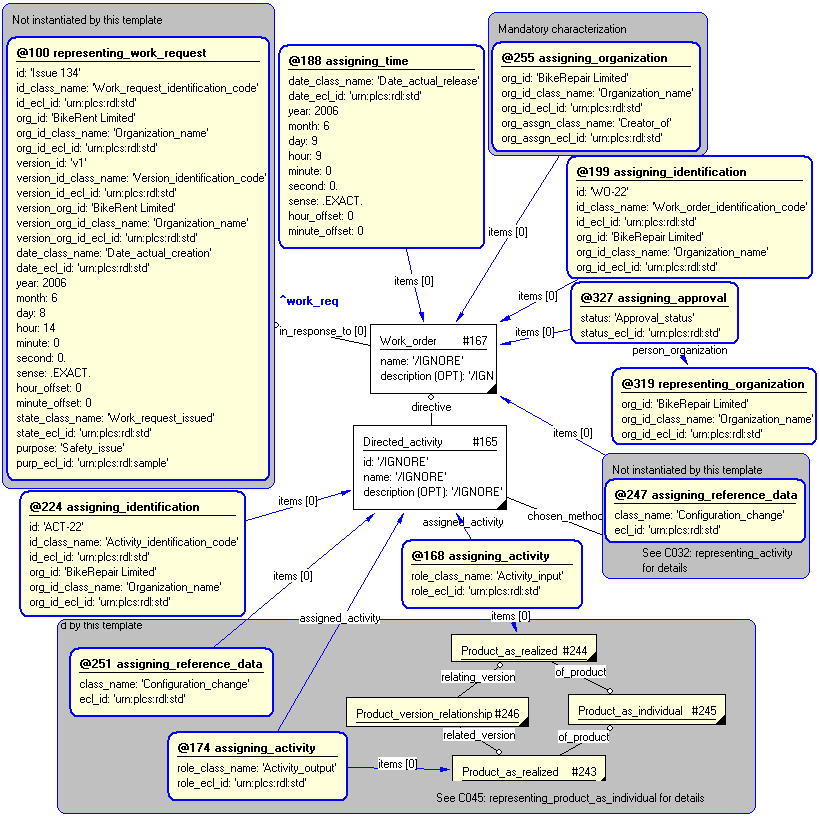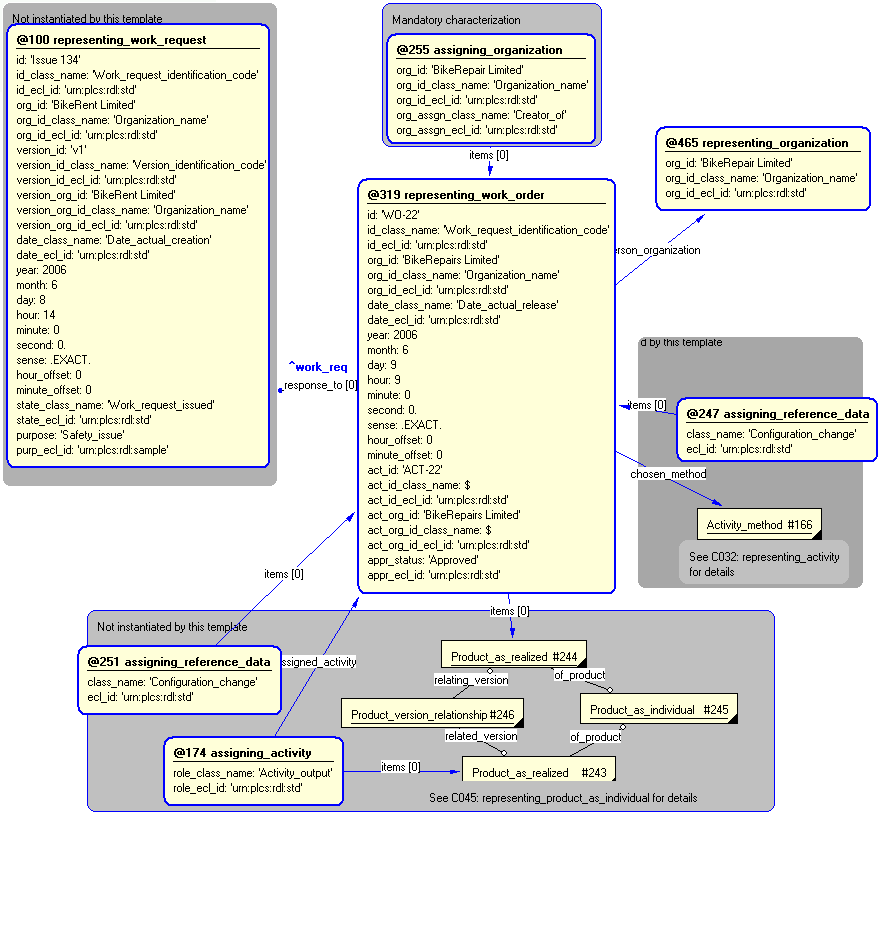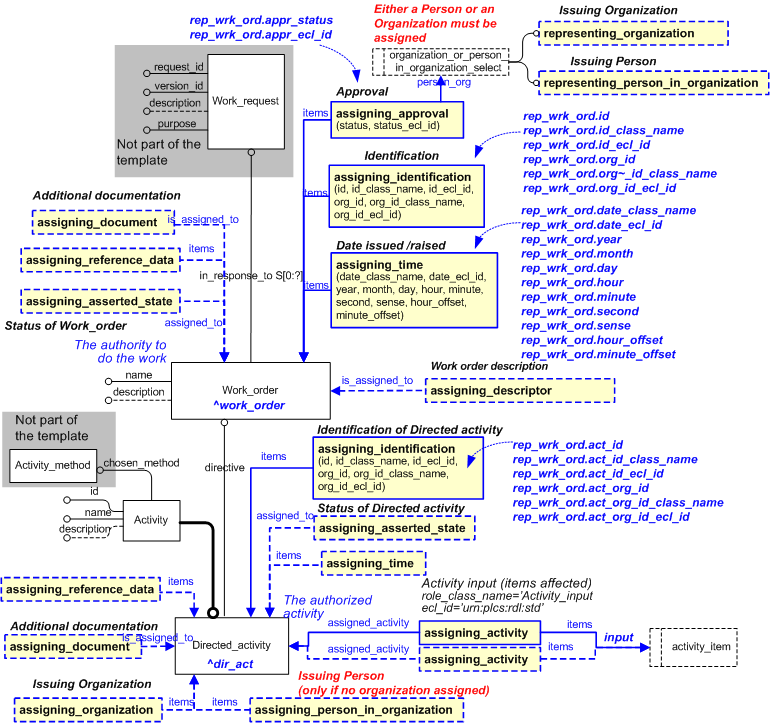| Template:— representing_work_order (rep_wrk_ord) |
Date: 2008/03/10 08:35:53
Revision: 1.30
|
This section specifies the template representing_work_order.
NOTE
An explanation of a template and the associated instantiation path is
provided in the
Template overview
section.
This template describes how to represent a work order - the authority to undertake some work
and the activity authorized by the work order.
The EXPRESS-G diagram in
Figure
1
shows the templates and EXPRESS entities that are required
to represent the template
"representing_work_order".
The text highlighted in blue shows the template parameters.
Figure 1 — An EXPRESS-G representation of the Information model for representing_work_order
The graphic for the template to be used in other EXPRESS-G diagrams
is shown in Figure
2
below.
Figure 2 —
The graphical representation of representing_work_order template
The following input parameters are defined for this template:
The name of the class used to classify the identifier and so
provide the role or reason for the identification.
The following classes and their sub-classes can be used:
id_ecl_id (Default=urn:plcs:rdl:std,Type='URN')
The identifier of the organization that
"owns" the identifier.
The name of the class being used to classify the
identification of the organization. For example CAGE code.
The following classes and their sub-classes can be used:
The name of the class defining the role of the date assigned to the
Work_order
E.g. the date the
Work_order
was issued.
The following classes and their sub-classes can be used:
The year component of the date and time the work order was issued.
The month component of the date and time the work order was issued.
The day component of the date and time the work order was issued.
The hour component of the date and time the work order was issued.
The minute component of the date and time the work order was issued.
This parameter is optional. If not given, it will remain unset.
The second component of the date and time the work order was issued.
This parameter is optional. If not given, it will remain unset.
The direction that the time the work order was issued is offset from Coordinated Universal
Time.
Enumeration values are: 'ahead', 'exact' or 'behind'.
The number of hours by which the time the work order was issued is offset from Coordinated Universal Time.
The number of minutes by which the time the work order was issued is offset from Coordinated Universal Time.
The value of this attribute need not be specified.
This parameter is optional. If not given, it will remain unset.
The name of the class used to classify the identifier in parameter @act_idand so
provide the role or reason for the identification.
The following classes and their sub-classes can be used:
The identifier of the organization that
"owns" the version identifier.
The name of the class being used to classify the
identification of the organization that
"owns" the version identifier. For example CAGE code.
The following classes and their sub-classes can be used:
The class name of the
External_class
corresponding to the approval status of the work order.
The following classes and their sub-classes can be used:
The identifier of the
External_class_library
storing the definition of the class referenced by the parameter @status.
The person or organization responsible for the approval.
The items that are affected by the work order
The following reference parameters are defined for this template:
Allow the
Work_order
entity instantiated in this path to be referenced when this template is used.
Note: The
Work_order
entity can be referenced in a template path by:
%^target = $representing_work_order.work_order%
where
target
is the parameter to which the
Work_order
is bound.
Allow the
Directed_activity
entity instantiated in this path to be referenced when this template is used.
%^target = $representing_work_order.dir_act%
%^target = $representing_work_order.appl_act%
The following parameter combinations specify a uniqueness constraint:
Unique constraint: Unique directed activity
Unique constraint: Unique work order
The instantiation path shown below specifies the entities that are to be
instantiated by the template.
-- Instantiate a Work_order Work_order-- Link the work_order to the work_request Work_order.in_response_to ->
@in_response_to-- Bind the Work_order to the parameter ^work_order. -- The parameter is a reference parameter so the Work_order -- entity can be referred to when this template is used. %^work_order =
Work_order%
^work_order.name = '/IGNORE'
^work_order.description = '/IGNORE'
-- Identify the Work_order /
assigning_identification(
id=@id,
id_class_name=@id_class_name,
id_ecl_id=@id_ecl_id,
org_id=@org_id,
org_id_class_name=@org_id_class_name,
org_id_ecl_id=@org_id_ecl_id,
items=^work_order)/
-- Assign a date to the Work_order /
assigning_time(
date_class_name=@date_class_name,
date_ecl_id=@date_ecl_id,
year=@year,
month=@month,
day=@day,
hour=@hour,
minute=@minute,
second=@second,
sense=@sense,
hour_offset=@hour_offset,
minute_offset=@minute_offset,
items=^work_order)/
-- Approve the Work_order /
assigning_approval(
status=@appr_status,
status_ecl_id=@appr_ecl_id,
items=^work_order,
person_org=@appr_pers_org)/
-- Instantiate a Directed_activity Directed_activity-- Link the Directed_activity to the work_order Directed_activity.directive ->
^work_order
-- Link the Directed_activity to the activity_method Directed_activity.chosen_method ->
@chosen_method-- Bind the Directed_activity to the parameter ^dir_act. -- The parameter is a reference parameter so the Directed_activity -- entity can be referred to when this template is used. %^dir_act =
Directed_activity%
^dir_act.id = '/IGNORE'
^dir_act.name = '/IGNORE'
^dir_act.description = '/IGNORE'
-- Identify the Directed_activity /
assigning_identification(
id=@act_id,
id_class_name=@act_id_class_name,
id_ecl_id=@act_id_ecl_id,
org_id=@act_org_id,
org_id_class_name=@act_org_id_class_name,
org_id_ecl_id=@act_org_id_ecl_id,
items=^dir_act)/
/
assigning_activity(
role_class_name='Activity_input',
role_ecl_id='urn:plcs:rdl:std',
assigned_activity=^dir_act,
items=@input)/
%^appl_act = $assigning_activity.appl_act%
The following entities are instantiated with attributes as specified:
The instance diagram in Figure
3
shows an example of the EXPRESS entities and templates that are instantiated by the template:
/representing_work_order(id='WO-22', id_class_name='Work_order_identification_code', id_ecl_id='urn:plcs:rdl:std', org_id='BikeRepair Limited', org_id_class_name='Organization_name', org_id_ecl_id='urn:plcs:rdl:std', date_class_name='Date_actual_release', date_ecl_id='urn:plcs:rdl:std', year='2006', month='6', day='9', hour='9', minute='0', second='0', sense='EXACT', hour_offset='0', minute_offset='0', appr_status='Approved', appr_ecl_id='urn:plcs:rdl:std', act_id='ACT-22', act_id_class_name='Activity_identification_code', act_id_ecl_id='urn:plcs:rdl:std', act_org_id='BikeRepair Limited', act_org_id_class_name='Organization_name', act_org_id_ecl_id='urn:plcs:rdl:std', input='#244', in_response_to='@100', chosen_method='#166')/
(an illustration of the consolidated representing_work_order template is shown in
Figure
4 below.)
Figure 3 — Entities instantiated by representing_work_order template
The instance diagram in
Figure
4
shows the graphic symbol for the template that is to be
used in other instance diagrams. The example template is:
/representing_work_order(id='WO-22', id_class_name='Work_order_identification_code', id_ecl_id='urn:plcs:rdl:std', org_id='BikeRepair Limited', org_id_class_name='Organization_name', org_id_ecl_id='urn:plcs:rdl:std', date_class_name='Date_actual_release', date_ecl_id='urn:plcs:rdl:std', year='2006', month='6', day='9', hour='9', minute='0', second='0', sense='EXACT', hour_offset='0', minute_offset='0', appr_status='Approved', appr_ecl_id='urn:plcs:rdl:std', act_id='ACT-22', act_id_class_name='Activity_identification_code', act_id_ecl_id='urn:plcs:rdl:std', act_org_id='BikeRepair Limited', act_org_id_class_name='Organization_name', act_org_id_ecl_id='urn:plcs:rdl:std', input='#244', in_response_to='@100', chosen_method='#166')/
Figure 4 — Instantiation of representing_work_order template
The following section details how the
representing_work_order
template can be optionally characterized by assigning
other constructs to it. These are characterizations commonly
applied to the template. The ISO 10303-239 EXPRESS model may enable
other assignments to the entities instantiated by the template.
The EXPRESS-G diagram in Figure
5
shows the possible characterizations of the template
"representing_work_order".
Figure 5 — Characterizations for representing_work_order template
The following characterizations may apply:
Characterization Assigning person or organization
NOTE this characterization is mandatory.
Characterization Assigning documentation
NOTE this characterization is optional.
Characterization Assigning state
NOTE this characterization is optional.
Characterization Assigning reference data
NOTE this characterization is optional.
Characterization Assigning dates and times
NOTE this characterization is optional.
